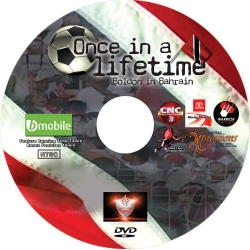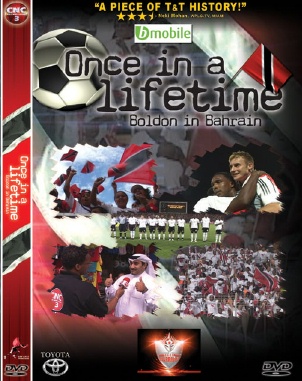Trinidad’s Ato Boldon talks about his latest project, “Once in a Lifetime”
MIAMI – Retired T&T Olympic sprinter Ato Boldon, now a senator in Trinidad and Tobago is in South Florida to promote his acclaimed documentary on the T & T Socawarriors’ historic win to qualify for the World Cup 2006.
Boldon’s film entitled Once in a Lifetime, Boldon in Bahrain chronicles the most critical game for the T& T football team, with their backs up against the wall in a do or die game November 16, 2005 in the middle eastern country of Bahrain.
Not only were the stakes high, but the team along with the fans and dignitaries with them are in the middle of unfriendly and unfamiliar territory.

Ato Boldon
Q – What made you do this film?
AB: I never intended for this to be a TV show as it was or a DVD in the current version. I simply was staying in front of the camera after making my US broadcast debut on the CBS network in 2005 and came back to Trinidad from Bahrain with footage that I turned into the TV version of the film, which generated such acclaim that I had no choice but to put it in a format where all Trinidadians and Tobagonians worldwide, and in fact all Caribbean people could have it as part of their collection.
Q-How would you describe the experience of being there?
AB: It was a mix of fear, joy and wonderment. Things I saw there I never saw anywhere else, in terms of the customs and culture of that country, and anyone who says they weren’t more than a little concerned when the fans start to throw rocks and anything else they
could find at us is not being honest.
The joy of having been there when your country qualifies for the World Cup for the first time ever outweighs all of the other experiences, though.
Q-In the film we see the journey on the plane going to the game…what was that like? Especially after the team had an embarrassing 1-1 draw in a poorly executed game at home?
AB: It was quite a contrast. In the front where the team was, it was quite somber. They were not happy with the outcome and they hadn’t gotten a chance to really process their performance mentally, since we had to depart immediately after the game, for Bahrain. Those of us in the back knew we had a long flight and were determined to enjoy ourselves and really start to become positive, as supporters. I
think it rubbed off on the team positively when they saw how confident we were that we would in fact be going to the World Cup despite that poor performance at home.
Q-Once in Bahrain, were trinis like fish out of water? For many of them it was their first time there, and to my surprise there were
trinis living in Bahrain!
AB: The customs of no public consumption of alcohol and no local females at the game were a bit shocking to many including myself, but Trinis adapt to anywhere, and as you mentioned, any Trini that was in a few thousand miles of Bahrain made sure they were in town to be able to see that game, particularly since it was a first in terms of that many locals being in that part of the world for something so exciting.
Q – Talk about the differences in culture, Trinis were festive ready to cheer on their team with drinks, pan and fete.. yet that wasn’t
an easy thing to do was it?
AB: As a very conservative Muslim nation, Bahrain was not ready for the type of public behavior that Trinbagonians display
normally.
Their attempt to keep us quiet even as supporters during the game was to not allow our pan and rhythm sections into the game.
My concern was not for the noise that would be missing in support, my real concern was that some of the musicians in those support bands had never been on a plane, and to ask them to fly 13 1/2 hours and NOT PLAY in a game of this magnitude I knew would be something that would be a terrible memory forever, so I was very relieved when we found out that they would, in fact, get to perform.
Q- The buildup to the game must have been intense… South Floridians were in a sports bar at 11am that Wednesday to watch the game..( which I’m happy to say is in the flim).. How were you feeling?
AB: was really concerned. Our strikers had looked that good in warm-up and I knew that we were in a hostile environment.
I am also so not used to being a supporter and a cheerleader, after being in intense battles myself for so many years I am like a fish out of
water when it’s that much on the line and I have absolutely no say in the outcome.
Q- I liked that you let Bahrainis have their moment too. That Bahraini guy in the market place was quite a trash talker..
AB: I think that is the high point of the film. The Bahrainis talked as though they had all already booked their tickets.
Trinis still complain to me about how much they hate seeing those scenes, but I counter by asking them if the first game had been away for us and we had tied 1-1 on their home ground and their team had played poorly, how confident would Trinis have felt about our chances at home in
Port-of-Spain?
We would have been sure of victory, just as they were. I enjoy that part of the film as much as when the celebrations
begin after we win.
Q- The Bahrainis tried to make sure the Trini fans were uncomfortable and unheard. What changed that?
AB: Jack Warner is a VICE PRESIDENT of FIFA. The Bahrainis tried to stop the rhythm section and the pan side from performing which really is not legal, and Jack was there to make sure they could not do that.
He knew that was a big factor in the team’s psychological game so he threatened, allegedly, to not sit in VIP if they enforced that ban, and they capitulated. I think that was way more important than most people realize.
Q – Talk about the game. I noticed Trinidad and Tobago’s Olympic gold medalist Hasely Crawford was also there he talked about the tension.
AB: The tension was bad enough I am sure for anyone watching it on television, but those who were actually there had to deal with it
happening right before their eyes, live, and knowing how much was riding on that opportunity and how rare such a chance is in a lifetime – and also dealing with the stress of being just 500 people in a hostile stadium of 30,000 or so people who, if security had not been as good as they were, would have had no problem leaving 500
injured Trinis right there in that stadium along with their dashed hopes of a World Cup berth. I truly believe that.
Q – I hate to give away the end but it is a tear jerker, how did it feel to be on that field?
AB: AS a grown man you don’t want to cry in public with tons of cameras rolling, but when grown men shed that facade it is a beautiful thing. To see Dwight Yorke, Russell Latapy and Shaka Hislop crying like babies and consoling each other is a beautiful thing, because it brings their careers and even their lives full
circle. THIS is why they have spent their lives dedicated to the sport, and here is the payoff, almost thirty years later. It is great theatre, and it’s the reason why this item was in such demand as a DVD so it could be handed down and shared, and not just as a TV show.
Q – Ato, you are doing so may things now. How does a sport ambassador, senator, film maker find time to be a pilot too?
AB: I speak to young people and implore them to try new things to work hard and to find things they love to do and pour themselves into it. Very often I find myself having to take my own advice, and it means that when opportunities come my way, I often have no fear of being involved in something I really have a passion for. I love my country, I love sports and I love flying. The fact that I have made a sports-themed film, become a senator, become a pilot and worked as an ambassador for sports seems very logical to me.
Q – There has been so much controversy over you becoming a senator. Why did you? Is Ato Boldon a politician now?
AB: I think it’s because people would have liked to see me remain neutral and not get in to politics, particularly since the party I joined is in some turmoil internally now. This was the harder of two decisions I could have made. The easier would to have remained in Los Angeles and tend to my own business, but I decided to try to get involved and see if anything can be done from this position.
I think that it can, and until I cease to think that I will be there trying to do my part. I ask many people why would it be controversial for me to want to serve my country in the highest form. If the political prejudice is taken out of it, it is apparent that such a move is consistent with my actions and deeds of the past 15
years.
Q – And finally I know that this interview is about Boldon in Bahrain but your lifelong fans are all gonna want to know if there is ever a chance for a track comeback? Do you have one more race in you?
AB: I have one or two more races in me. It would take at least four good ones to be an Olympic medalist again or even Olympic Champion, so I will leave that part of my life retired, and leave TnT track and field in the very capable hands it now lies in.

Ato Boldon’s documentary “Once in a lifetime: Boldon in Bahrain” can be purchased on www.BoldoninBahrain.com. You can contact him always on www.atoboldon.com, an award winning website perfect for any track and field fan.




